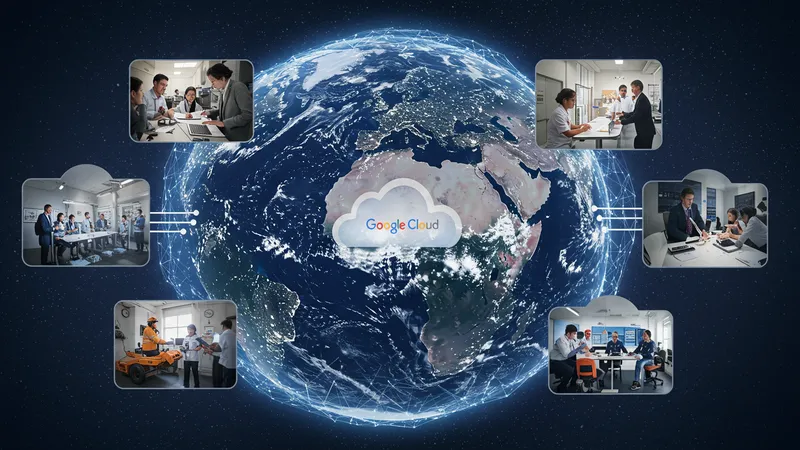


Ever wondered how Google Cloud transformed a simple server space rental into a global powerhouse, processing five billion queries every single day? It’s the tech titan quietly dominating the digital universe. But what if I told you that's just scratching the surface of its true potential?
In an era where digital-first is the mantra, Google Cloud isn't just a convenient tool—it's a vital cornerstone of innovation, resilience, and competitive edge. As companies scramble to adapt to a cloud-first world, understanding its undercurrents has never been more crucial.

While many see Google Cloud as just another storage option, it goes beyond simple data management. Imagine a system that not only stores your data securely but also fulfills your analytical dreams. Thanks to its advanced tools, businesses have reported an astonishing 30% efficiency gain. But that’s not even the wildest part...
Surprisingly, Google Cloud's commitment to green energy makes it not just tech-savvy but environmentally vigilant. It’s been carbon neutral since 2007, targeting 100% renewable energy. Tech meets sustainability, and what it unlocks is transformative. Yet, there's more beneath its surface that’s just waiting to unfold...
What happens next shocked even the experts—an exploration of how Google Cloud is not just a service but a revolution. But how deep does this rabbit hole really go? Prepare to uncover what truly makes it an unmissable force in today’s tech landscape.
Google Cloud isn't merely a collection of digital storage solutions—it's arguably one of the largest networks of innovation. Consider this: Google processes more than 100 petabytes of data per day. This staggering amount is akin to 10,000 Libraries of Congress. But what’s more intriguing is how each byte is pivotal in shaping futuristic AI applications that redefine industries.

Such innovation is not accidental. It’s the result of intricate systems and algorithms designed to continuously learn and improve. Google Cloud's AI platform, noted for its precision, powers everything from real-time language translation to predictive analytics. Yet, even with all this advancement, there's still room for untapped potential that’s just waiting to be discovered.
The cloud isn’t just about efficiency—it’s about unlocking possibilities that were once inconceivable. Businesses are leveraging Google Cloud's massive computing abilities to perform complex calculations that would otherwise take days. But there's more—it's not just the 'how' but the 'why' behind these calculations that you won’t believe until you see it yourself.
Despite its revolutionary capabilities, Google Cloud maintains a user-centric approach. It's as if this titan of tech anticipates user needs before they arise, crafting solutions that fit seamlessly into existing workflows. Imagine a world where technology complements, rather than complicates. But there’s a curveball—discovering the intrigue behind this seamless usability.
When it comes to cybersecurity, Google Cloud stands as a bastion of safety. With threats lurking at every corner in cyberspace, it safeguards its users like a fortress. Security isn’t merely a feature—it’s an ethos. Google employs over 700 experts solely dedicated to safeguarding user data. Still, this is only the beginning.

Astonishingly, Google’s encryption processes are nearly impenetrable, designed meticulously to thwart even the most sophisticated attacks. Its in-depth approach to data privacy is like a multi-layered armor, yet easy for organizations to navigate. However, what's more thought-provoking is the tech giant's transparency in handling data—something few could've anticipated.
But that’s not all. Google Cloud has pioneered breakthroughs in Zero Trust security models, ensuring that even if an infiltrator bypasses the first line of defense, the battle isn’t won. The system's intelligently segmented layers present a labyrinth too complex to navigate. But there's another angle to this story—discover the partnership that takes this security to the next level.
As we pull back the layers of Google Cloud’s defenses, what stands out isn’t just the barriers but the foresight to anticipate cybersecurity evolution. It’s a proactive stance, akin to a master chess player thinking several moves ahead. But there’s more at play here—even seasoned professionals are left astounded by the intricacies yet to be revealed.
For businesses, every penny counts. Enter Google Cloud—a champion in delivering return on investment. Companies report not just savings, but newfound revenue streams previously unimaginable. But how exactly does it turn cost into opportunity? This tale of financial wizardry is as impressive as it is complex.

Imagine reducing infrastructure costs by up to 40%, as businesses optimize operations without sacrificing performance. It’s not just about cutting expenses; Google Cloud elevates operational efficiency to new heights. The key isn’t just trimming expenditure, but investing in innovation that pays exponential dividends. And yet, there’s an ace in the hole yet to be unveiled.
Return on investment with Google Cloud doesn't just calculate figures—it evaluates opportunities for expansion. Companies report reaching new markets faster and scaling products with unmatched flexibility. However, what's even more surprising is the robust ecosystem that Google fosters, empowering businesses to take charge creatively. This is just the tip of the iceberg.
With an integrated environment that nurtures ideas, Google Cloud serves as a springboard for startups and giants alike. It's not merely about technology; it’s about transformation—a narrative that shifts traditional notions of business growth. Embedded within its architecture are secrets only the daring venture to exploit. But there's more than meets the eye—and it's revealing.
In a world grappling with climate change, Google Cloud sets itself apart with a commitment to sustainability that’s more than commendable—it’s groundbreaking. Google aims for full carbon-free energy supply by 2030. This isn’t just a goal; it’s a revolution in how tech cares for the planet. But what inspired such a commitment?

Google Cloud's data centers are already 50% more energy-efficient than typical, an achievement made possible by smart analytics and renewable energy sources. Yet, these numbers are but a glimpse into a broader vision of eco-friendly operations. But what drives this determination? The secret lies in their sustainability partnerships and green innovations.
But innovation doesn’t stop with green energy. Google Cloud has implemented strategies to drastically reduce water consumption in data centers, showcasing a comprehensive approach to resource conservation. Such measures ensure that tomorrow’s tech won’t come at yesterday’s environmental expense. There's a profound depth to this eco-strategy that goes beyond mere statistics.
Imagine if every cloud service could offset its carbon footprint, harmonizing progress with planetary well-being. Google Cloud makes this vision not just achievable, but inspiring for an entire industry. It’s a testament to what’s possible when ambition meets responsibility. And yet, behind this noble facade lies a narrative that’s left even the critics spellbound.
At the forefront of Google Cloud’s technological prowess is its advanced machine learning capabilities. This is no longer the stuff of science fiction—it's here, and it's shaping our world. Google’s ML solutions automate, predict, and personalize on a level previously thought impossible. But where does this power truly lie?

The magic of machine learning within Google Cloud is its genius simplicity. Users harness highly sophisticated models without the demand for extensive coding knowledge. Empowering developers and data scientists with tools that reveal insights tucked away in terabytes of data is more than a feature—it’s a game-changer. But just how far can this technology go?
Delving deeper, Google Cloud’s investment in TensorFlow, an open-source ML framework, has democratized AI capabilities, enabling even the smallest startups to innovate like Silicon Valley’s finest. Its accessibility is unmatched, yet there’s a nuanced layer—tales of breakthroughs that unveil its full potential.
As organizations dive into machine learning, they unlock predictive insights that drive business decisions and customer engagements. Yet the full capacity of these tools leaves one wondering—how much further can they stretch the boundaries of possibility? The stories that follow are bound to redefine machine learning’s very essence.
Behind every great technology are the stories that attest to its power. With Google Cloud, these success narratives are as diverse as they are inspiring. Around the globe, businesses are reimagining what's possible by leveraging its capabilities. But what are these stories, and why are they significant?

One prominent tale is of a healthcare company that reduced its data processing time from hours to mere minutes, thanks to Google’s potent computing power. Lives transformed, not just improved, exemplifying the cloud’s profound effect on critical services. Yet, this isn't the only field where Google Cloud shines brightly.
Retail giants have harnessed Google Cloud for real-time inventory optimization, radically improving customer experience and operational efficiency. It’s a leap in logistics made reality, entwining technology with commerce seamlessly. However, in the midst of this transformation, there’s a deeper layer to uncover—how these stories rewrite industry norms.
Fascination grows as academics and artists alike find inspiration in Google Cloud's resources, breaking barriers in education and creativity. It’s not just tech; it's empowerment through knowledge and artistic expression. These success stories might just challenge the boundaries of what we believe tech can achieve in our daily lives.
The educational landscape has been forever altered by technological advancements, with Google Cloud at the helm of this transformation. Schools and universities are leveraging its resources to provide cutting-edge learning experiences. But how exactly has Google Cloud become a staple in education?

Through its robust cloud solutions, teachers and educators craft personalized learning paths for students, facilitating an environment where technology and pedagogy intersect harmoniously. This isn’t merely a supplement; it’s evolution in education powered by boundless resources. But there’s more to this academic tale than meets the eye.
Institutions are not just adopting tech but are synergizing their curriculums with Google Cloud’s tech-centric environment. This integration has paved the way for innovative research methodologies and collaborative platforms that transcend traditional learning barriers. Yet the most startling aspect is how it nurtures future-ready skills.
Educators are witnessing an era where Google Cloud’s versatility births a new generation of learners adept in digital fluency, poised to tackle future challenges. Its integration is not a mere trend; it’s the cornerstone of contemporary education. Will the knowledge gained today forge paths unforeseen? The unexpected twists in education await discovery.
Beyond the everyday tools and services, Google Cloud supports a plethora of global initiatives that reach far beyond commercial interests. Governments, NGOs, and global enterprises harness this technology to address challenges ranging from disaster relief to disease management. But what drives these groundbreaking collaborations?

Imagine orchestrating a global response to natural calamities within hours, utilizing Google Cloud’s processing power and connectivity. It has enabled rapid, coordinated efforts, saving lives when seconds matter most. These global interventions articulate just how Google Cloud transcends its tech confines to weave into the fabric of humanity.
The collaboration stories reveal another dimension where Google Cloud transforms abstract concepts into tangible solutions. Through partnerships with climate scientists and urban planners, it generates simulations that guide policy and inform city planning. Yet, there’s still a broader impact at play that hasn’t been fully unwrapped.
In bridging technological gaps, Google Cloud offers underrepresented communities a platform to amplify their voices and innovate in spaces historically inaccessible. It highlights what’s possible when technology empowers voices at the fringes. But the true breadth of these initiatives goes beyond simple connectivity—it's about changing lives in ways once deemed impossible.
Behind the flashing screens and stacks of data lies an unseen world—the cognitive transformations induced by Google Cloud. Beyond technical merits, it has altered how users think, learn, and interact. Delving into this realm, what are the less visible, yet profound effects on cognition?

Google Cloud’s user-friendly tools effortlessly align with our everyday workflows, making complex tasks simple. As users engage frequently, these interactions sharpen cognitive skills, enhancing problem-solving abilities and decision-making. But here’s the intriguing part—how deep do these changes permeate our daily lives?
Studies reveal that tech platforms like Google Cloud do more than aid—they actively teach, developing neural pathways that foster adaptability and innovation. These transformations challenge traditional cognitive boundaries, leading to newfound creative processes. But questions remain on how these evolutionary leaps shape human potential.
Imagine a world where tech integration doesn’t just meet our needs but anticipates them, aiding cognitive growth at every step. The paradigm shifts in perception and interaction are remarkable, yet the deeper implications on our minds and society are just beginning to be understood. What follows next is uncharted territory ripe with discovery.
Standing at the forefront of technological evolution, one might wonder what the future holds for Google Cloud. As innovate as it is today, the digital horizon promises even greater transformations. Yet, what groundbreaking innovations lie in wait, concealed within the ever-evolving cloud services?

From AI advancements to cutting-edge cybersecurity protocols, Google Cloud's trajectory is geared towards shaping future paradigms. But innovation doesn’t end there; there's much more, including unforeseen applications of cloud computing that promise radical shifts in how we conceive possibilities.
The potential extends beyond mere enhancements—it’s a journey into entirely new realms of connectivity and capability. Imagine an era of seamless integration where virtual and physical worlds coexist harmoniously. Yet, dissecting this boundless potential, what groundbreaking milestones will change the technology landscape forever?
As Google Cloud continues to challenge limits and redefine standards, its role in carving our digital future remains undeniable. There's a certain inevitability about its impact on technology and lives alike. Beyond these projections, an even greater story unfolds—one that redefines our interaction with technology at its core.
As Google Cloud drives us forward into an era of endless possibilities, it becomes clear that technology and innovation are inexorably linked with shaping our society. The journeys that await, shrouded in potential and opportunity, beckon us all to explore further.
Sharing this unfolding narrative not only illuminates the path of Google Cloud but beckons readers and visionaries to partake in this digital revolution. As velvety clouds expand their reach, who knows what uncharted terrains lie just beyond the horizon? Embrace this evolution, for its echoes will shape generations.